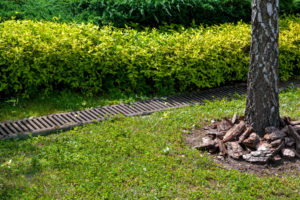
Too much water can place a lot of stress on a lawn – it can promote the growth of fungal diseases, weeds, and more.
As spring approaches on the horizon, with it comes the potential for rain storms. Of course, keeping your lawn watered is perhaps the most fundamental of lawn maintenance tasks, but too much of a good thing can threaten its health. Too much water can place a lot of stress on a lawn – it can promote the growth of fungal diseases, weeds, and more. So it’s important to have a plan in place to protect your turf – that way you can be sure the April showers will turn into metaphorical May flowers. Here’s what to think about when heavy rain threatens your lawn.
Pre-Storm Preparations
The number one tip we can offer prior to big storm – make sure to turn off your sprinkler system. It may seem obvious, but it’s easy to forget the obvious when prepping for a big storm. Get yourself in the habit of turning off the sprinkler system whenever the forecast is showing a steady rainfall. Better yet, consider an electronic rain sensor to do this for you!
As the storm comes, take photos anywhere you happen to see puddles of rainwater forming. With everything that goes on in the aftermath of a big storm, you might forget exact areas on your turf that will require more attention. Taking pictures will help you remember where to dedicate that attention.
Immediately After the Storm
Make sure that you stay off of your turf for some time after a storm lets up. You’ll need the soil to dry and firm up a little bit, and stepping on the turf will create ruts that will be very difficult to fix later. After the soil has dried, complete a thorough inspection of the lawn. Remove leaves, twigs, and other items that may have gotten onto the lawn – this will help with the drying process and help protect against the growth of fungus and other diseases.
Long Term Planning
Proper landscape design goes a long way in protecting lawns from the negative effects of rain storms. It may be worth investigating whether you have all of the elements necessary. Check your drainage systems to make sure they are in working order and able to handle rain storms. A French drain might help you redirect water away from vulnerable areas of your lawn. Finally, if your turf is densely compacted, consider aerating it to promote rainwater draining further into the soil.
Have More Questions? Stay in Touch!
Order early and order often to ensure the best service possible. Contact us through our online page. Please find us at 27616 Little Lane, Salisbury, Maryland 21801. Our phone number is 410-726-6103, and our fax number is 410-742-6550. Speak to Jason Anderson for Turf Grass Sales. Reach him by email at jason@quanticocreeksod.com. Finally, follow us on social media on Facebook, LinkedIn, and our blog!
